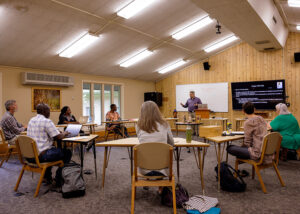This fall is unlike any fall in my memory. As a new Mennonite pastor, I am entering this fall listening to the hearts and minds of the congregation at Foothills Mennonite Church and helping discern how our church lives faithfully within our neighbourhood and beyond.
After two-and-a-half years of pandemic-inhibited ministry, churches must be re-engaging our contexts with fresh eyes and imaginations for what God is doing. In a time of disruptive change, the church has the potential to be both a place of stability and a catalyst for change in the direction of the gospel.
Individuals and communities struggle to establish identity and purpose in this climate of uncertainty and polarization. We are surrounded by manifold narratives that vie for allegiance—stories describing how to understand the world and our place in it.
These narratives we appropriate have a determinant influence on our development, personalities and actions. What we believe about the reality of the world around us shapes us. Narratives create reality, and our identities and lives are shaped by the narratives of the communities that we inhabit.
No one is exempt from the influence of narratives. They are ubiquitous. Stories give structure and meaning to every context we inhabit. However, they are never neutral. Every narrative shapes us in a particular direction. So it is important that we are attentive to the narratives in our lives.
A redemptive role of the church is to come alongside our communities, engage real people and real life, and enforce narratives that exemplify the redemptive activity of God in the world. The church engages neighbours and neighbourhoods around God’s vision for restoration for all.
The church is an agent of hope. By building relationships with real people in their communities, and engaging real-life stories of their neighbours, the church brings people together toward a dominant narrative of hope.
As an active participant in a community, the church has an essential role in shaping the shared narrative of that community. The gospel is the presence and power of God to change the world. The gospel narrative has an impact on the community when it is embodied by the church community in its context.
The church helps to shape the community’s shared narrative in a way that reflects God’s creative and active participation in the world. The church invites people to form their identity in what God has done and is doing. The church shapes the narratives of the community toward the redemptive work of God in the world.
People develop an understanding of the positive impact of their lives in the world and the integral place of the church in the world. The gospel infuses the various shared narratives with imagination and creativity, redeemed for God’s purposes. God’s redemptive work is truly the hope of the world, and God is calling the church to active participation in that redemption.
Bill Christieson is pastor of Foothills Mennonite Church in Calgary. He recently completed a doctor of ministry degree in Christian community development.
Read more From Our Leaders columns:
Evangelism that heals
A season of Jubilee
Diversity in our unity: Belonging to each other in the body of Christ
Thoughtful and prayerful changeovers in ministry
Receiving a life-giving word









Leave a Reply
You must be logged in to post a comment.